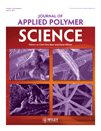Thermal and morphological stability of polystyrene microcapsules containing phase-change materials
Abstract
Polystyrene microcapsules with paraffin wax as the active agent [phase-change material (PCM)] were produced by a Shirasu porous glass emulsification technique and a subsequent suspension-like polymerization process. The suitability of the obtained microcapsules for textile applications was studied. The thermal properties, surface morphology, and structural stability of the PCM microcapsules were investigated with differential scanning calorimetry, thermogravimetric analysis, and environmental scanning electron microscopy. The microcapsules could be used without any appreciable damage or irreversible changes in their integrity until 135°C. Furthermore, these microcapsules were heat-resistant and could endure the curing conditions of textile coating up to 140°C for 30 min. In addition, the stability of the microcapsules under common laundering conditions was tested. It was confirmed that the microcapsules were durable enough and maintained their stability during stirring in hot water and alkaline solutions. © 2010 Wiley Periodicals, Inc. J Appl Polym Sci, 2011




